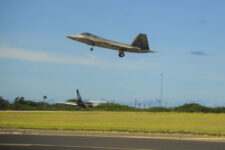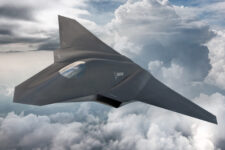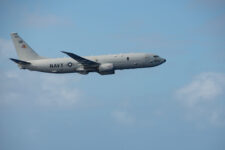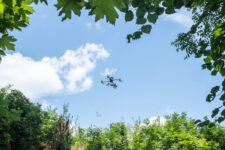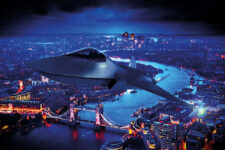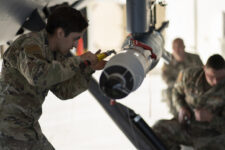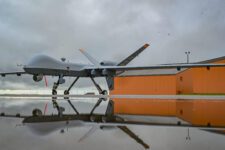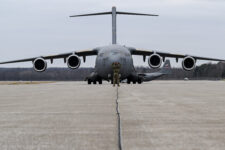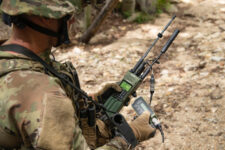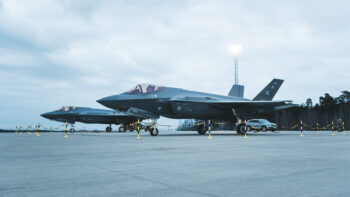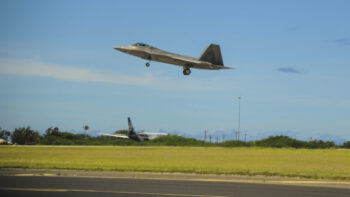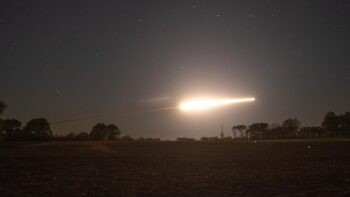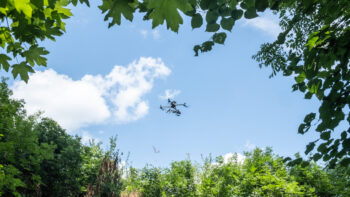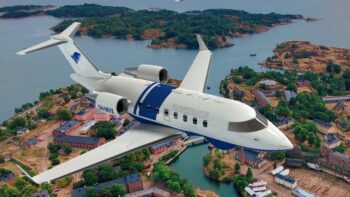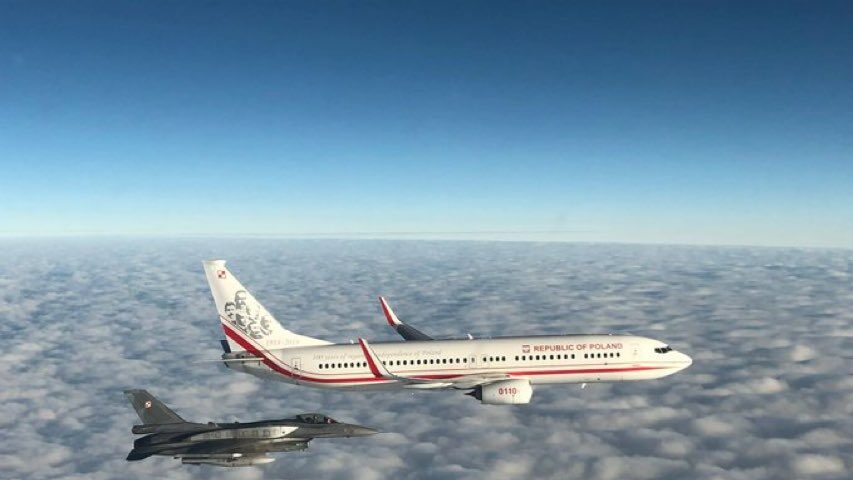
A Polish Air Force F-16 fighter jet escorts the country’s World Cup soccer team to Qatar. (Polish MoD)
BELFAST — It has been difficult not to be morally conflicted by watching the FIFA World Cup, knowing what we do of host country Qatar’s human rights record and migrant workers deaths reportedly resulting from building the tournament’s stadiums. Without wishing to deflect from that, I will be exploring some of the most striking European defense stories to have emerged from 2022 while shining a spotlight on which players have stood out on soccer’s grandest stage.
If the link between the two seems tenuous, strap yourselves in for a voyage into the unknown. Also take into consideration that in compiling this list, I am at a serious disadvantage to my Breaking Defense editorial colleagues who have had a full 12 months to look over and select their best stories, whereas poor old me will be working off scraps due to being a relatively new hire. Your sympathies are most welcome. So, without any further ado or other excuses to hand, let the show begin.
1. Russian troops held me captive at gunpoint for two weeks in Ukraine. Here’s what I learned
Frankly, all other defense stories in 2022 hardly merit attention compared to Reuben Johnson’s heroic story of enduring Russian captivity after his car was ambushed while he was trying to flee Ukraine. Eventually forced into an underground bunker and confined to a room without heating or basic sanitation, Johnson describes living “in a hole” for two weeks, with jarring imagery of scenes more closely tied to Nazi Germany. This is Russia’s repression of Ukraine experienced first hand and a sad, bleak reminder that history will ultimately remember 2022 for the war launched by President Vladimir Putin on Feb. 24.
Reuben Johnson World Cup player equivalent: Argentina’s Lionel Messi (Brought a fairy tale ending to life)
2. Mired in politics, Franco-German next-gen fighter ‘likely headed for the 2050s’
The Frano-German-Spanish Future Combat Air System (FCAS) program stood out in 2022 as Europe’s star attraction for controversy and drama. What’s the best word to frame Dassault’s approach to partnerships, ‘headstrong”? This is a company that denied a claim by the French government — its own government — that a contract for the all important Phase 1B demonstrator had been signed after a protracted round of negotiations. Think of Lockheed Martin taking aim at the DoD in a similar manner.
Now, the two European primes of Dassault and Germany-based Airbus are effectively locked into a fundamentally uncomfortable partnership that, if not urgently improved, threatens to throw the FCAS program so badly off course that Dassault’s CEO said it could delay the fighter’s entry to service by a decade. The first flight of the fighter isn’t scheduled for another seven years, itself a two year delay beyond previous plans.
FCAS’ World Cup player equivalent: Switzerland’s Granit Xhaka (Never afraid of confrontation)
3. UK, Japan and Italy launch global combat air program to deliver next generation fighter
As the FCAS program shows, any defense program involving partner nations will inevitably involve more drama than most others, so from a reporting perspective it is a real gift to have two rival sixth generation fighter projects being developed in Europe. At least that was until the Global Combat Air Programme (GCAP) separated itself as an international construct, merging UK and Italian Tempest/FCAS plans with Japan’s F-X program.
A straightforward even promising development right? I can hear readers reasoning, “uniting UK, Japanese and Italian aerospace industries and technologies must be a bit of a masterstroke, especially with the size of Japan’s economy to lean on for long-term funding security.” Drama averted right? Wrong. Sweden managed to squeeze the drama free air from the room by not being a signatory to the GCAP pact. That means that for the moment GCAP will not be privy to Gripen knowhow, despite Sweden being part of Tempest/FCAS. There wasn’t much by way of explanation from Saab either, outside of the company being “focused on supporting the Swedish authorities on reviewing the Swedish FCAS context.”
GCAP’s World Cup player equivalent – Brazil’s Neymar (Supremely talented, delivers flashes of brilliance but accused of being an underachiever)
4. Economic troubles could put the UK in firing line of more defense takeovers
In this report, I explored why UK defense takeovers are looking especially likely lately, due to everything from small businesses unable to secure bank loans to others considering rebranding as humanitarian companies in order to secure new investment. Filled with expert opinion, this rounded assessment of largely US manufacturers acquiring UK defense assets expands on a widely reported narrative on takeovers linked to a weakened British pound, to include the influence of the Church of England, “setting the tone” for investors in London’s financial district.
UK defense takeovers World Cup player equivalent – USA’s Christian Pulisic (Always on hand to beat an opposition’s defensive line)
5. Sweden follows Norwegian lead and axes NH90 helicopter fleet
It is tricky to say exactly why, but there’s something endearing about Scandinavian solidarity, like when the news broke that Sweden was following the path of Norway and axing its NH90 helicopter fleet. In truth, the decision itself was not unexpected, as Maj Gen Carl-Johan Edstrom, chief of the Swedish Air Force, had told journalists in July that availability rates of the aircraft were a problem and that a decision regarding the future of the NH90 fleet was to be determined in November 2022. But the decision nonetheless surprised and dealt a further blow to NHIndustries’ already tarnished reputation. NHIndustries said at the time that the “size of available fleet” had been “temporarily reduced over the last years” on account of a retrofit and upgrade program. Both Norway and Sweden have still to confirm new orders to replace their respective NH90 fleets, so look out for more on that in 2023.
NH90 World Cup player equivalent – Portugal’s Cristiano Ronaldo (Once a legend, now critics say a spent force)
